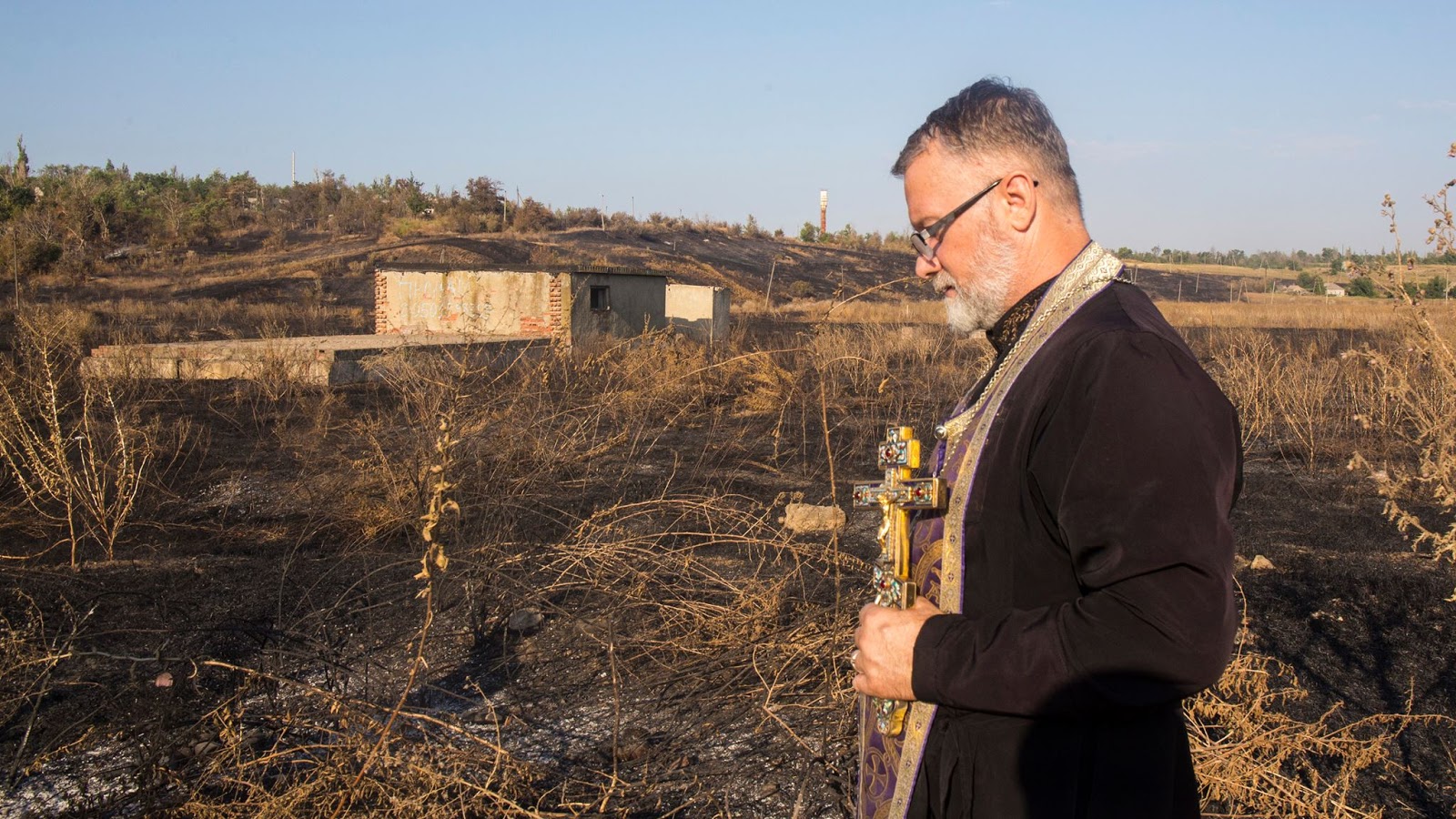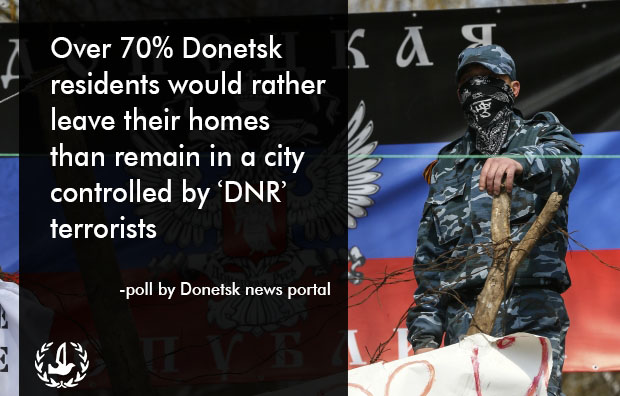"The absolute worst part of being a prisoner of war was not knowing when you would be killed- worse than the beatings, just the uncertainty of when that moment would arrive because you begin to fear it all the time…”
Father Valentyn Serovetskyi, a priest of the Ukrainian Orthodox Church (Kyiv Patriarchate), had spent 59 days as a captive of the "Luhansk People’s Republic" ("LNR"), a Kremlin-run statelet in eastern Ukraine. Over the course of this internment, he could have died two or three times.
In a video interview, Father Valentyn, who died in 2016, speaks about the Euromaidan revolution, about the war zone in Donbas, and about his experience of being in a prison camp of the Russian-separatist forces in Donbas. The themes of his interview describe events in Ukraine that, one way or another, affect everyone.
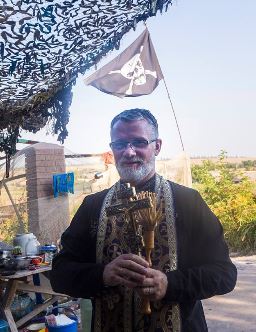
Father Valentyn once owned a business but it started going bankrupt. It reached a point where he was going hungry, and had reached a crossroads between life and death. Desperate, he made a promise that if he survived, he would commit the rest of his life to God. The result was that he became a priest at the Mykhailiskiy Zolotoverkhyi monastery in central Kyiv. During the Euromaidan revolution, its bells called people to gather in the central square, and it housed a hospital where care was given to injured protesters.
Father Valentyn became one of the priests of Euromaidan. When over a hundred Euromaidan protesters were killed as a result of Berkut attacks, he cared for their funerals and remained at the square until the very last protesters left. When a Russian-inspired conflict started in eastern Ukraine. His interview is translated below.

The absolute worst part of being a prisoner of war was not knowing when you would be killed- worse than the beatings, just the uncertainty of when that moment would arrive, because you begin to fear it all the time, but they would only fire past your ears, shout for you to stand up, ask if you had any last words, throw things around. You’d have no idea what they intended, when they said we’ll be back in an hour to kill you, or tomorrow we’ll do it. It was very difficult to endure these moments. But for me, as a distraction from my fears, God sent others into my cell who were treated far worse than they treated me. I would focus on them, how I could help them, instead of thinking about my situation.
About the Maidan: When a person watches television and sees that your children are being beaten and killed, I don’t understand how a man could stand by without going to the Maidan. And as for a priest, it baffles me even more how they could say that they must be above politics. That is one thing. But when people are dying, people are being beaten, a priest should be there against this evil, when arms are raised against others. I couldn’t understand how a priest could respond by saying that God is in his heart, and meanwhile, he stays home and watches television from his couch, indifferent, waiting for some resolution to the conflict.
My position has always been unequivocal. My wife was in the hospital during this time, and so I packed a suitcase and went to the Maidan. I didn’t even ask anyone for advice, even my children. I have five children. There was such an injustice against people, against students, and half a million people responded together, from cities all over Ukraine. We saw hope, perhaps there would be a change in our country for the better. We could understand the need to elect a president in one ballot, we wanted to believe in him. Then we saw Turchynov and Yatsenyuk, taking their seats in the Verkhovna Rada, and they were interested in their office, but no longer in the Maidan. How they had promised that every decision would be referred to the Maidan. There were no changes. We thought the new president would make these changes, only later did we see how he conducted himself. It’s as if the Maidan never happened.
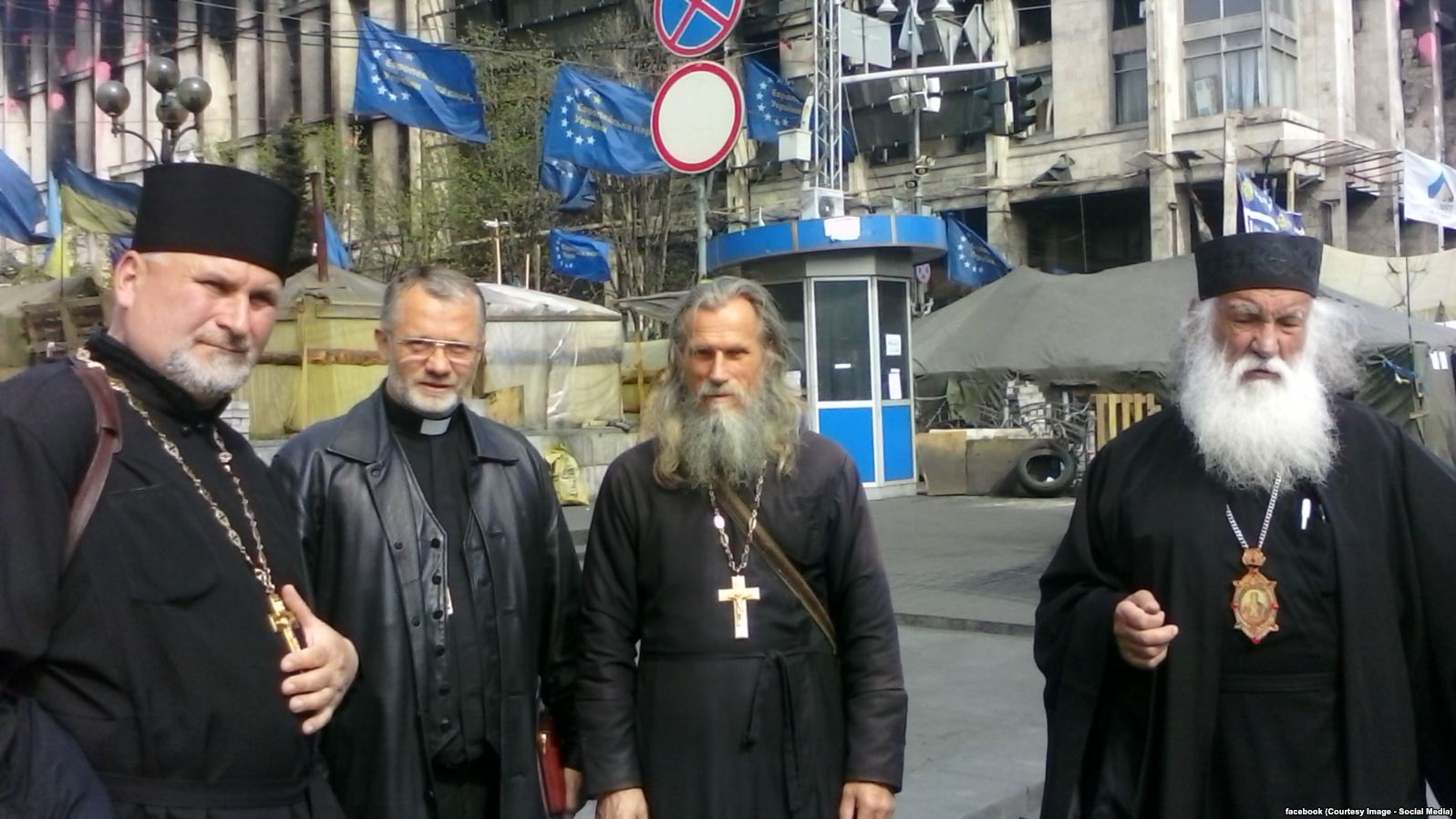
I saw all the Heavenly Hundred [the protesters killed during protests during the Euromaidan revolution in Kyiv - ed]. I was responsible for that work and each one of them passed through my hands. I was there every day.
At that time no one could imagine what would happen in the east. We thought people would be running around with weapons for a while, like a game, then they would return with their weapons and official recognition that they had been involved in armed conflict on behalf of the country. Before they left they had lots of people wanting to sell them things, protective vests for so much, or helmets at this cost, and if a person wanted a uniform of the armed forces or the national guards or the police. We gave them blessings before they left. No one could imagine the horrors that awaited them. Bus after bus left for the east.
And then the fighters began to run back to the Maidan from the east, and tell us, with such horror in their eyes, about what happened to busloads of fighters. Gone. They had no chance. We found it hard to believe. Everywhere there was chaos. Those who returned would stand on the Maidan stage and cry, describing the Grad bombardments, it was all unimaginable.
I began to organize humanitarian trips, to see for myself how the men were living and what it was they really needed. We went to Sloviansk. And to those from Zhytomyr who were responsible for Sloviansk. It was unlike anything seen on television. I came back to the Maidan and made a report. We began to help the soldiers and also the refugees, the displaced persons. With food, and we took bibles. That is how I was captured and taken prisoner. There were gunshots, everyone was scared, running for their lives. This war is the first time our country has faced the terrible reality of such a loss of life on our own soil. It took over a year for most of us to come to terms with what we experienced.

When we were captured there were four of us, including a woman who worked with refugees, a journalist, too, and a veteran of the Afghan war who shared the driving with me. It was at night when we were captured, past 9 P.M. Everyone was in uniform and protective vests. They asked us why we were driving around, and who was our commanding officer. Of course, we didn’t have one. They demanded our documents. Mine stated Kyiv, the journalist was from Lviv, the woman from Simferopol. The veteran was from Dnipropetrovsk.
They brought us to General Kozitsin, and those with him recognized me right away. I didn’t have to say anything about myself. That’s because during the Maidan, from a room in the Hotel Ukraina, two Russian television stations were recording the Maidan 24 hours a day. Every morning and every evening I would be on the stage, “Good Morning, Maidan,” I would lead prayers, sing hymns.
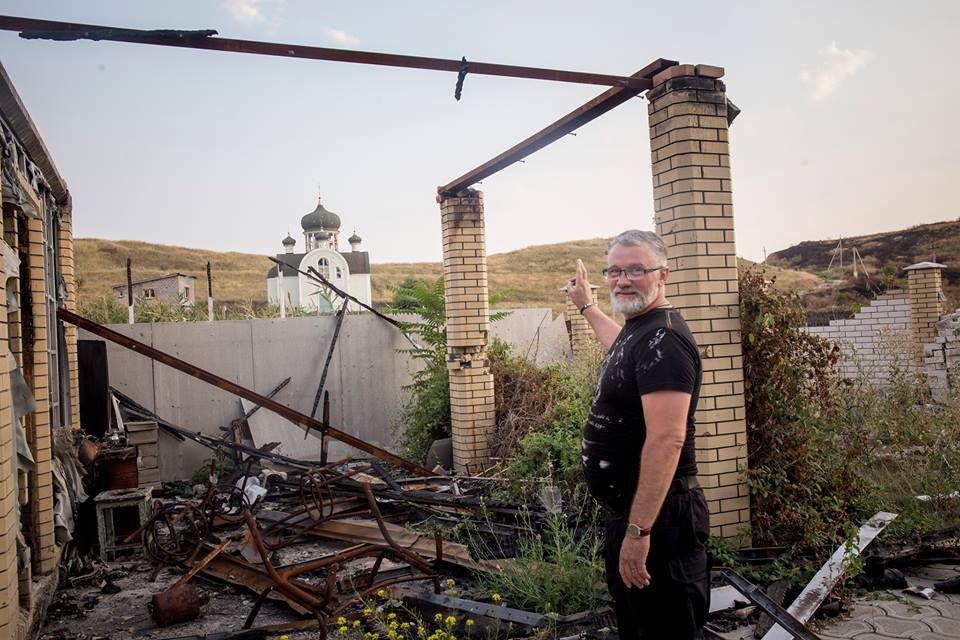
Kozitsin asked if I understood the seriousness of what happened to us. I replied that even under these circumstances a human being should conduct oneself humanely, to which he agreed, just before he had me beaten, broke my ribs. He said a soldier is a soldier, some on one side, some on the other, and when captured you decide his fate. But as a priest, since I had blessed fighters from the Right Sector to kill their parents and children, I would suffer the consequences.
The blessing I gave was for them to defend their land, that’s what’s in the bible, not to become murderers, to defend their government, no matter how poor of a government it may be.
From the Second Vatican Council, they wrote that a priest has the right to bear arms in self-defense, in defense of one’s country, one’s family, but only self-defense. Whether it is called war or ATO, the priest is there to protect the soul of a soldier, guard them against becoming traitors to their own humanity, encourage them to be faithful to their families, to their parents.
The captors didn’t care what I said, just that I gave this blessing to murderers. It was a ruse, an excuse to rationalize my torture.
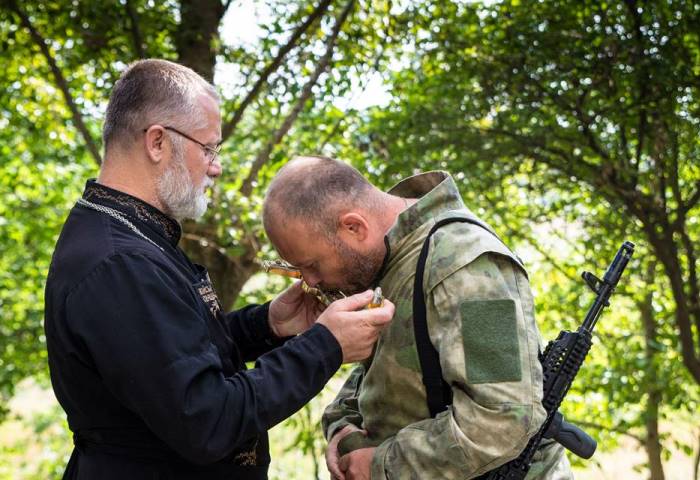
At one point we could tell that we had crossed over into Russia. We could hear our border guards and the Russian border guards. They kept us in Russia all that night, until morning. The Russians would not take responsibility for us. We were sent to another place and stayed there 8 days. We were hungry a the time, and they gave us no food. Then we arrived at Luhansk. Already there they fed us one meal a day, usually about 10 at night. The meal was always a bland porridge. Sometimes there was bread, sometimes not. If there was soup, it was the water from boiled potatoes, but the potatoes they ate themselves.
They had a routine of beating us before they fed us. Once a day, every day, they gave us a beating. Men would return from the front. They would get cleaned up to eat, get drunk, and then have renewed energy to come after us. Some would be more interested in looking for women, but others would beat us up. What they wouldn’t do when they were drunk. They would shoot their weapons into the air, give us electric shocks, all sorts of things.
We didn’t have work orders. I had two others with me, one they killed by smashing his skull. They made me bury him, but they said only the garbage dump was good enough for him, not even a cemetery or Ukrainian soil, only garbage. These men from Right Sector were the only ones who stopped this aggression.
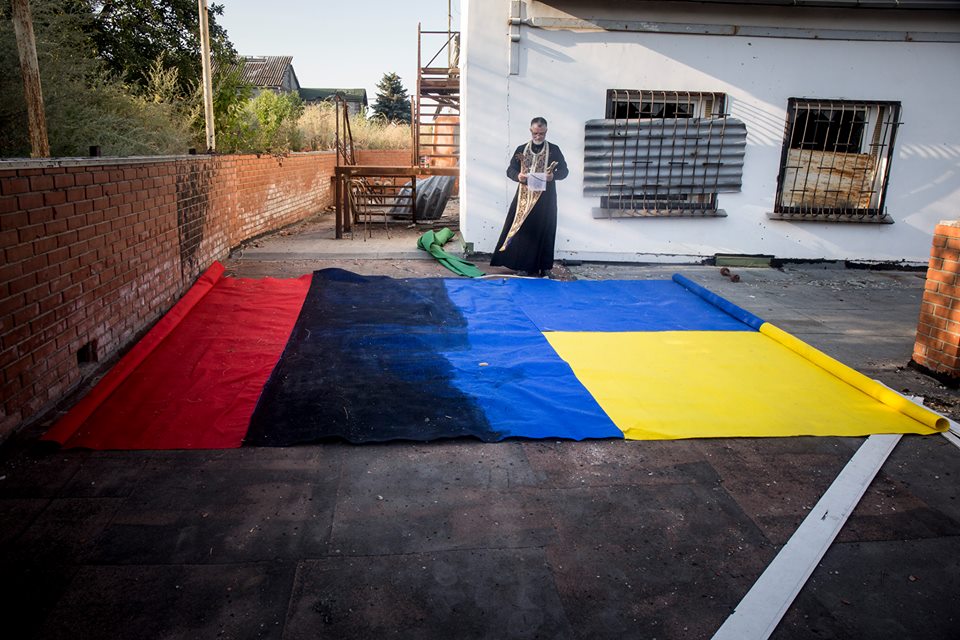
What happened to me is nothing compared to what they did to others, breaking hands, gouging out eyes. What I experienced was easy by comparison. One was hurt so bad from the rifle butt, that he had a concussion. That part of the brain responsible for logical thought and speech was affected, and he couldn’t answer simple questions. You could tell that he knew he had no control over what he was saying. He was crying often, and tried hard to regain control. They thought he would kill himself. Finally, a doctor began to care for him. He told him that in six months his mind would be worse unless he tried to regain the use of his logic.
Sashko was losing hope, but I told him that God is stronger than anything. I taught him to pray the Lord’s prayer. When I was resting, in those times when they weren’t beating us, I could hear him talking to himself. He was afraid he would lose the ability to speak.
I feel only pity for my captors. If I were to see them now, I don’t know what I would do, what my true feelings would be. But I am a priest, and I forgave them. They are victims of a dictatorship. People are starting to come to their senses, whether in Luhansk or the Russians that come across the border who were involved in these actions earlier.
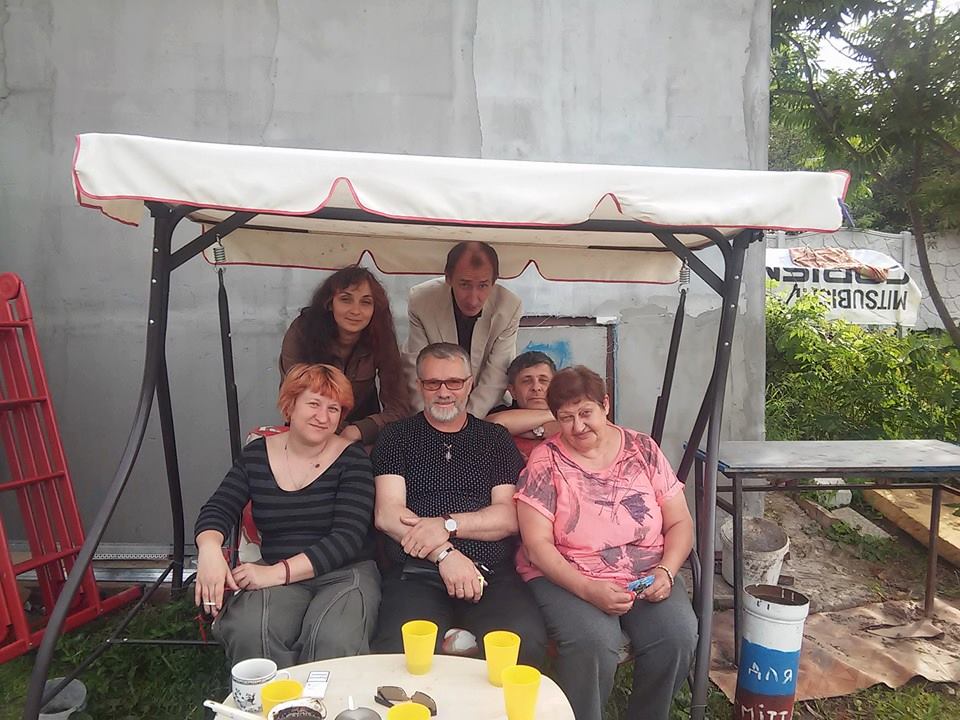
My freedom was arranged by Muslims, who are businessmen, that’s what they care about. They don’t watch the propaganda on television. They come back and forth freely from Luhansk to Kyiv, for Friday prayers, for example. People in Kyiv began to ask them for help, saying that our priest is being held there somewhere, but we can’t find him.
They found me. I don’t know what fee they charged, they did what they could. When I was released, Plotnytsky [self-proclaimed "head" of the "Luhansk People's Republic - ed] told me that I won’t get my vehicle back, and I won’t get my documents either. Kozitsin kept everything. He wrote a letter on my behalf so that no one would detain me along the way from the Russian checkpoint to the Ukrainian checkpoint. After my release, it took another month before the other three who had been with me were also released.

